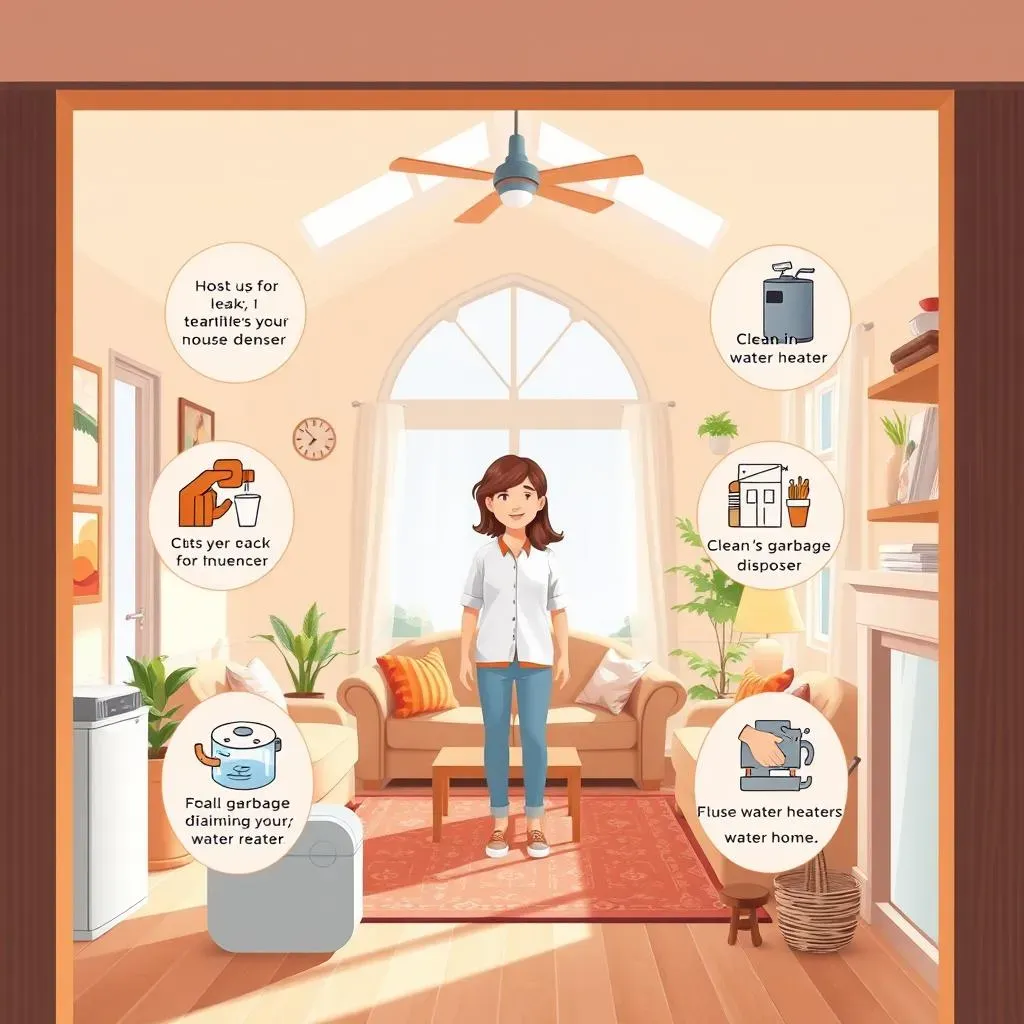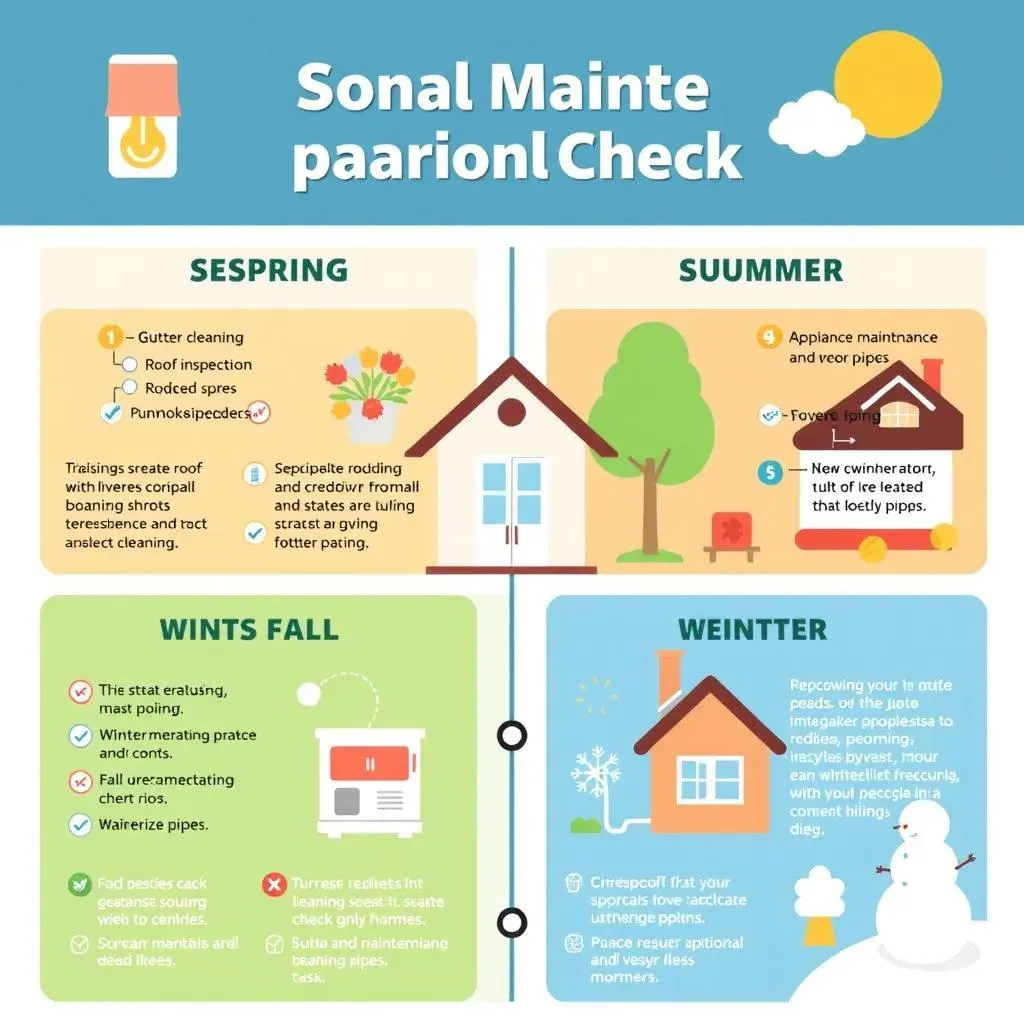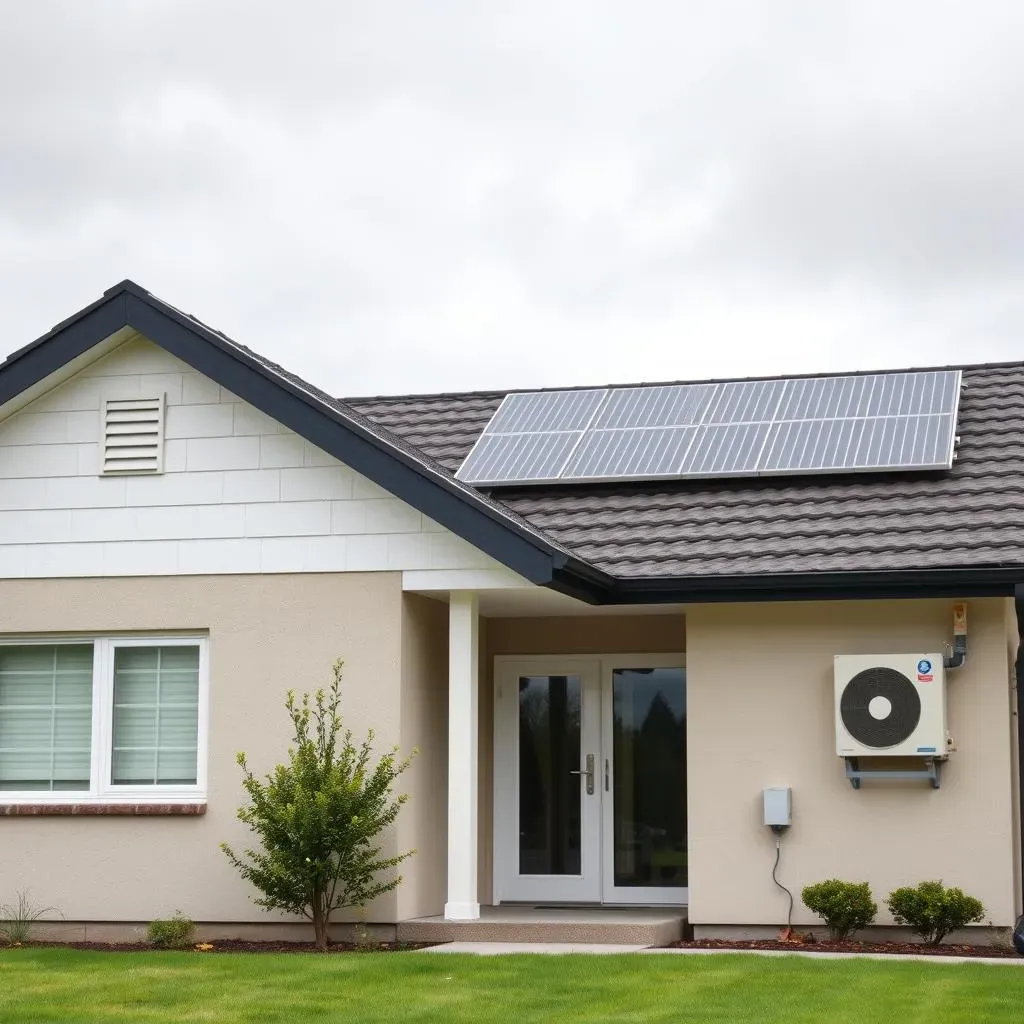Table of Contents
Owning a house is a big deal—it's likely your biggest investment! But keeping it in tip-top shape doesn't have to be a daunting task. This comprehensive guide will walk you through everything you need to know about how to maintain a house, ensuring it remains a safe, comfortable, and valuable asset for years to come. We'll break down the essential monthly maintenance tasks that prevent small problems from becoming costly repairs. Then, we'll explore a seasonal checklist, covering specific upkeep needs for spring, summer, fall, and winter. We'll also delve into the crucial aspects of maintaining your house's exterior, from protecting your roof to keeping your landscaping looking great. Finally, we'll cover the important major systems—plumbing, electrical, and HVAC—showing you how to proactively address potential issues before they become major headaches. Get ready to become a home maintenance pro and keep your house shining! Let's dive in.
Essential Monthly Tasks for Maintaining Your House
Essential Monthly Tasks for Maintaining Your House
Protecting Your Home's Plumbing
Let's face it, nobody wants a plumbing disaster. A little monthly attention goes a long way. First, check all your faucets and pipes for any leaks—even tiny drips add up over time and can cause significant damage. Next, give your garbage disposal a good cleaning. Run some ice cubes and baking soda through it to help break down food particles and keep it running smoothly. Don't forget about your drains! A slow-draining sink or shower is a sign of a buildup of hair and grime. Regularly cleaning them prevents clogs and keeps water flowing freely. Finally, consider flushing your water heater to remove sediment buildup and prolong its lifespan. This simple task can improve efficiency and save you money on your energy bills. It’s a small effort that can prevent major headaches down the road. For more in-depth advice, check out our post on .
Remember, prevention is key! Regularly checking your plumbing system will help you catch small problems before they escalate into major, expensive repairs. Think of it like a regular check-up at the doctor—it’s much better to address a minor issue before it becomes a serious problem. Plus, a well-maintained plumbing system simply makes your life easier. No more worrying about unexpected leaks or frustrating clogs! This proactive approach to home maintenance ensures peace of mind and saves you money in the long run. You'll thank yourself later.
Task | Frequency | Why It's Important |
|---|---|---|
Check for leaks | Monthly | Prevent water damage |
Clean garbage disposal | Monthly | Prevent clogs and odors |
Clean drains | Monthly | Prevent clogs |
Flush water heater | Monthly | Improve efficiency and lifespan |
Maintaining Your Home's Safety Systems
Safety should always be a top priority in your home. Start by testing your smoke and carbon monoxide detectors. This is crucial for your family's safety, and it only takes a few minutes. Replace the batteries if needed, and make sure they're in working order. While you’re at it, check the expiration date on your fire extinguisher. If it's expired, replace it immediately. A working fire extinguisher can be a lifesaver in an emergency. Next, inspect your electrical cords for any signs of damage, such as fraying or cracks. Damaged cords are a fire hazard, so replace any that look worn or damaged. Finally, take a walk around your home and check for any potential hazards, such as loose floorboards or frayed carpets. Addressing these small issues now will prevent accidents later. For more ideas on ways to improve your home's safety, check out this helpful article on .
Taking these simple steps will go a long way toward ensuring your family’s safety and peace of mind. Remember, a safe home is a happy home! These safety checks are quick and easy, but they’re incredibly important. Don't put them off—your safety is worth it. By taking a few minutes each month to address these potential safety hazards, you’re making a significant investment in the well-being of your family and your home.
- Test smoke detectors
- Test carbon monoxide detectors
- Check fire extinguisher
- Inspect electrical cords
- Check for general hazards
Seasonal House Maintenance Checklist: Spring, Summer, Fall, Winter
Seasonal House Maintenance Checklist: Spring, Summer, Fall, Winter
Spring Cleaning and Prep
Spring is the time for renewal, and that includes your home! After a long winter, your house might need some extra TLC. Start by cleaning out your gutters and downspouts. Leaves and debris can clog these vital drainage systems, leading to water damage. Next, inspect your roof for any damage from winter storms. Look for missing or damaged shingles, and make repairs as needed. Check out our post on for more tips. Don't forget your windows and doors! Inspect the caulking and weather stripping around them, and replace any that's cracked or worn. This will help keep your home energy-efficient and prevent drafts. Finally, give your exterior a good power wash to remove any dirt and grime that accumulated over the winter. A clean exterior not only looks great, but it also protects your home's siding from damage.
Once the exterior is tackled, turn your attention indoors. Clean your air conditioner filter and schedule a professional service to ensure it's running efficiently for the warmer months. Inspect your appliances, making sure they are working correctly. Check for leaks around your sinks and toilets. For more in-depth advice on appliance maintenance, check out our article on .
- Clean gutters and downspouts
- Inspect and repair roof
- Caulk and weatherstrip windows and doors
- Power wash exterior
- Clean air conditioner filter
Summer Maintenance
Summer brings warm weather and longer days, but it also brings its own set of home maintenance challenges. Focus on keeping your home cool and comfortable. Regularly clean your air conditioner filter. A dirty filter restricts airflow and reduces efficiency, leading to higher energy bills and potential damage to your system. Also, check your dryer vent for lint buildup. Lint is a fire hazard, so make sure to clean it out regularly. Check out our guide on for more tips. While you're at it, inspect your outdoor faucets and hoses for leaks. Leaks can waste water and cause damage to your landscaping. Finally, keep an eye out for pests. Summer is the peak season for insects and rodents, so take steps to prevent infestations.
Regularly check your home's exterior for any signs of damage from the summer heat. Look for cracks in your foundation, driveway, or walkways. Repair any damage promptly to prevent further problems. Also, consider investing in window treatments to help keep your home cool and reduce energy costs. For more insights on keeping your home cool, check out this article on .
Task | Frequency | Why It's Important |
|---|---|---|
Clean air conditioner filter | Monthly | Improve efficiency and prevent damage |
Clean dryer vent | Monthly | Prevent fires |
Check for leaks | Weekly | Prevent water damage |
Pest control | As needed | Prevent infestations |
Fall Preparations
As the leaves change color and fall begins, it's time to prepare your home for the colder months ahead. One of the most important fall tasks is cleaning your gutters and downspouts again. Fallen leaves can quickly clog these systems, leading to water damage during the fall rains and winter snow melt. Check out our guide on for more details. Next, inspect your roof for damage and make any necessary repairs. Look for missing or damaged shingles, and address any leaks. Also, inspect your chimney and fireplace, making sure they're clear of debris and ready for use. A blocked chimney can lead to a dangerous buildup of carbon monoxide.
Winterize your outdoor faucets and pipes to prevent them from freezing and bursting. This simple step can save you from costly repairs. Inspect your windows and doors for drafts and seal any gaps with caulk or weather stripping. This will help keep your home warm and energy-efficient. For more tips on winterizing your home, check out our article on .
- Clean gutters and downspouts
- Inspect and repair roof
- Inspect chimney and fireplace
- Winterize outdoor faucets and pipes
- Seal windows and doors
Winterizing Your Home
Winter brings cold temperatures and potential for damage to your home. One of the most important tasks is to protect your pipes from freezing. Insulate exposed pipes and allow a slow drip of water from faucets to prevent freezing. Also, check your heating system to ensure it is running efficiently and safely. Regular maintenance of your furnace or boiler will help keep it running smoothly and prevent costly breakdowns. Check out our helpful checklist on for more details. Don't forget to keep an eye on your roof and remove any snow or ice buildup to prevent damage. Heavy snow accumulation can cause structural damage to your roof.
Regularly check your home for any signs of water leaks or damage. Winter weather can cause leaks in your roof, walls, or foundation. Address any leaks promptly to prevent further damage. Also, be sure to test your smoke and carbon monoxide detectors and replace the batteries if needed. These safety checks are crucial for your family's well-being. For tips on keeping your home safe and warm during winter, check out this article on .
Task | Frequency | Why It's Important |
|---|---|---|
Protect pipes from freezing | Before first freeze | Prevent burst pipes |
Check heating system | Before winter | Ensure efficient and safe operation |
Remove snow and ice from roof | As needed | Prevent roof damage |
Check for leaks | Weekly | Prevent water damage |
How to Maintain a House Exterior: Protecting Your Biggest Investment
How to Maintain a House Exterior: Protecting Your Biggest Investment
Protecting Your Roof
Your roof is your home's first line of defense against the elements. Regular inspections are vital. Look for missing, damaged, or loose shingles. Check for any signs of leaks, water stains on ceilings or walls, or moss growth. Addressing minor issues early prevents major, costly repairs down the line. A little preventative maintenance can save you thousands of dollars. For more in-depth advice, check out our post on .
Cleaning your gutters and downspouts is also crucial. Clogged gutters can lead to water damage, ice dams in winter, and foundation problems. Remove leaves, debris, and other obstructions regularly. If you're uncomfortable working at heights, consider hiring a professional for this task. Your roof and gutters are critical to protecting your home's structural integrity. For more tips on roof maintenance, check out this helpful article on .
Task | Frequency | Why It's Important |
|---|---|---|
Inspect roof | Twice yearly | Identify and repair damage |
Clean gutters | Twice yearly | Prevent water damage |
Maintaining Your Siding and Exterior Walls
Your home's siding protects it from the weather. Regularly inspect it for cracks, damage, or loose pieces. Repair or replace damaged sections promptly. Power washing your siding once or twice a year removes dirt, grime, and mold, improving its appearance and extending its lifespan. For more detailed information, check out our guide on .
Pay attention to the caulking around windows and doors. Cracked or missing caulking allows air and water to enter your home, leading to drafts, energy loss, and potential damage. Reapply caulking as needed to maintain a tight seal. Also, inspect the paint on your exterior walls for peeling, chipping, or fading. Repainting as needed protects your siding from the elements and keeps your home looking its best. For more tips on exterior painting, check out this helpful article on .
- Inspect siding for damage
- Power wash siding
- Caulk windows and doors
- Repaint as needed
Landscaping and Exterior Features
Your landscaping contributes significantly to your home's curb appeal and overall value. Regularly maintain your lawn, trimming it and removing weeds. Prune trees and shrubs to prevent overcrowding and maintain their health. Mulch flower beds to retain moisture and suppress weeds. For more detailed landscaping tips, see our guide on .
Inspect walkways, patios, and driveways for cracks or damage. Repair or replace damaged sections promptly to prevent tripping hazards and further deterioration. Keep your gutters and downspouts clean and free of debris to prevent water damage. Regularly check fences and gates for damage and make repairs as needed. A well-maintained landscape enhances your home's beauty and protects its structural integrity. For more tips on landscaping maintenance, check out this helpful article on .
Task | Frequency | Why It's Important |
|---|---|---|
Mow lawn | Weekly | Maintain lawn health |
Prune shrubs | Twice yearly | Maintain plant health and shape |
Inspect walkways | Yearly | Identify and repair damage |
Major Systems Maintenance: Plumbing, Electrical, HVAC for Your House
Major Systems Maintenance: Plumbing, Electrical, HVAC for Your House
Plumbing System Care
Your plumbing system is the unsung hero of your home, quietly working away to keep things running smoothly. Regular maintenance is key to preventing costly repairs and ensuring everything functions as it should. Start by checking all visible pipes and connections for any signs of leaks. Even the smallest drip can lead to significant water damage over time. Next, pay attention to your water heater. Flushing it periodically removes sediment buildup, improving efficiency and extending its lifespan. This simple task can save you money on your energy bills and prevent premature failure. For more tips on water heater maintenance, check out our article on .
Don't forget about your drains! Slow-draining sinks and showers are often a sign of clogs. Regularly cleaning them with a drain cleaner or a plunger prevents bigger problems down the road. Addressing these minor issues proactively prevents major backups and keeps your plumbing system running smoothly. A well-maintained plumbing system provides peace of mind and saves you money in the long run. It's a small investment that pays off big time. For more in-depth advice, check out our post on .
- Check for leaks
- Flush water heater
- Clean drains
Electrical System Checks
Your home's electrical system is another critical area that needs regular attention. Start by visually inspecting all your electrical cords and outlets. Look for any signs of fraying, damage, or loose connections. These are potential fire hazards, so address any issues immediately. Regularly testing your GFCI outlets (ground fault circuit interrupters) in bathrooms and kitchens is crucial for safety. These outlets are designed to prevent electrical shocks, and testing them regularly ensures they're functioning correctly. For more comprehensive electrical safety tips, check out our article on .
Don't overload your circuits. Too many appliances running on the same circuit can cause overheating and potential fires. Use power strips wisely and be mindful of the total power draw. If you notice flickering lights or frequently tripping circuit breakers, it's a sign of a potential problem. Consult a qualified electrician to diagnose and fix the issue before it becomes a bigger hazard. Regular electrical system checks prevent electrical fires and ensure the safety of your home and family. For more insights on electrical system maintenance, check out this article on .
Task | Frequency | Why It's Important |
|---|---|---|
Inspect cords and outlets | Monthly | Prevent fire hazards |
Test GFCI outlets | Monthly | Prevent electrical shocks |
Check circuit breakers | Monthly | Identify overloaded circuits |
HVAC System Maintenance
Your HVAC (heating, ventilation, and air conditioning) system is responsible for your home's comfort year-round. Regular maintenance is essential for efficiency and longevity. Start by changing your air filters monthly. Dirty filters restrict airflow, reducing efficiency and potentially damaging your system. Scheduling an annual professional inspection and cleaning is highly recommended. A professional can identify potential problems early on, preventing costly repairs. For more information on HVAC maintenance, check out this comprehensive guide on .
Regularly check your ductwork for leaks or damage. Leaky ducts reduce efficiency and waste energy. Addressing leaks promptly saves you money on your energy bills. Also, inspect your outdoor units (air conditioners and furnaces) for any signs of damage or debris. Keep the area around the units clear to ensure proper airflow. Regular HVAC maintenance ensures your system operates efficiently and safely, providing comfortable temperatures year-round. For more tips on keeping your HVAC system in top shape, check out this helpful article on .
- Change air filters
- Schedule annual professional inspection
- Check ductwork for leaks
- Inspect outdoor units